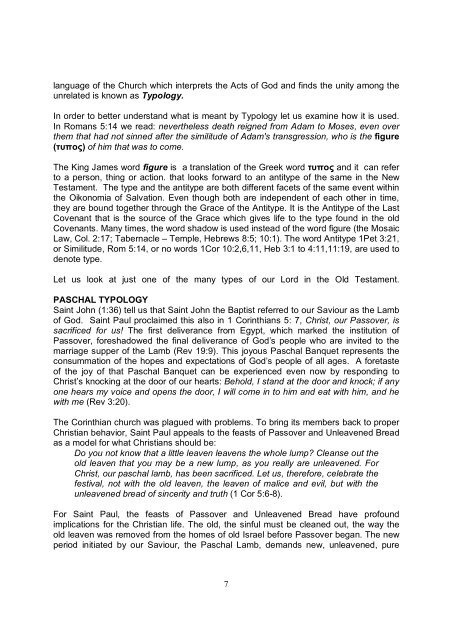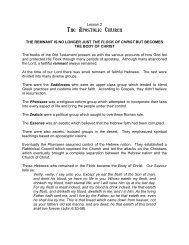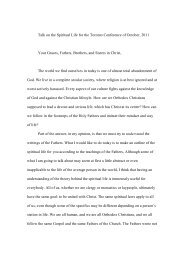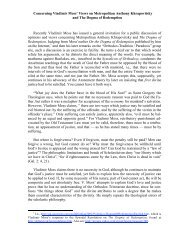According to the Scriptures - Saint Nektarios Greek Orthodox Church
According to the Scriptures - Saint Nektarios Greek Orthodox Church
According to the Scriptures - Saint Nektarios Greek Orthodox Church
You also want an ePaper? Increase the reach of your titles
YUMPU automatically turns print PDFs into web optimized ePapers that Google loves.
language of <strong>the</strong> <strong>Church</strong> which interprets <strong>the</strong> Acts of God and finds <strong>the</strong> unity among <strong>the</strong><br />
unrelated is known as Typology.<br />
In order <strong>to</strong> better understand what is meant by Typology let us examine how it is used.<br />
In Romans 5:14 we read: never<strong>the</strong>less death reigned from Adam <strong>to</strong> Moses, even over<br />
<strong>the</strong>m that had not sinned after <strong>the</strong> similitude of Adam's transgression, who is <strong>the</strong> figure<br />
(τυπος) of him that was <strong>to</strong> come.<br />
The King James word figure is a translation of <strong>the</strong> <strong>Greek</strong> word τυπος and it can refer<br />
<strong>to</strong> a person, thing or action. that looks forward <strong>to</strong> an antitype of <strong>the</strong> same in <strong>the</strong> New<br />
Testament. The type and <strong>the</strong> antitype are both different facets of <strong>the</strong> same event within<br />
<strong>the</strong> Oikonomia of Salvation. Even though both are independent of each o<strong>the</strong>r in time,<br />
<strong>the</strong>y are bound <strong>to</strong>ge<strong>the</strong>r through <strong>the</strong> Grace of <strong>the</strong> Antitype. It is <strong>the</strong> Antitype of <strong>the</strong> Last<br />
Covenant that is <strong>the</strong> source of <strong>the</strong> Grace which gives life <strong>to</strong> <strong>the</strong> type found in <strong>the</strong> old<br />
Covenants. Many times, <strong>the</strong> word shadow is used instead of <strong>the</strong> word figure (<strong>the</strong> Mosaic<br />
Law, Col. 2:17; Tabernacle – Temple, Hebrews 8:5; 10:1). The word Antitype 1Pet 3:21,<br />
or Similitude, Rom 5:14, or no words 1Cor 10:2,6,11, Heb 3:1 <strong>to</strong> 4:11,11:19, are used <strong>to</strong><br />
denote type.<br />
Let us look at just one of <strong>the</strong> many types of our Lord in <strong>the</strong> Old Testament.<br />
PASCHAL TYPOLOGY<br />
<strong>Saint</strong> John (1:36) tell us that <strong>Saint</strong> John <strong>the</strong> Baptist referred <strong>to</strong> our Saviour as <strong>the</strong> Lamb<br />
of God. <strong>Saint</strong> Paul proclaimed this also in 1 Corinthians 5: 7, Christ, our Passover, is<br />
sacrificed for us! The first deliverance from Egypt, which marked <strong>the</strong> institution of<br />
Passover, foreshadowed <strong>the</strong> final deliverance of God’s people who are invited <strong>to</strong> <strong>the</strong><br />
marriage supper of <strong>the</strong> Lamb (Rev 19:9). This joyous Paschal Banquet represents <strong>the</strong><br />
consummation of <strong>the</strong> hopes and expectations of God’s people of all ages. A foretaste<br />
of <strong>the</strong> joy of that Paschal Banquet can be experienced even now by responding <strong>to</strong><br />
Christ’s knocking at <strong>the</strong> door of our hearts: Behold, I stand at <strong>the</strong> door and knock; if any<br />
one hears my voice and opens <strong>the</strong> door, I will come in <strong>to</strong> him and eat with him, and he<br />
with me (Rev 3:20).<br />
The Corinthian church was plagued with problems. To bring its members back <strong>to</strong> proper<br />
Christian behavior, <strong>Saint</strong> Paul appeals <strong>to</strong> <strong>the</strong> feasts of Passover and Unleavened Bread<br />
as a model for what Christians should be:<br />
Do you not know that a little leaven leavens <strong>the</strong> whole lump Cleanse out <strong>the</strong><br />
old leaven that you may be a new lump, as you really are unleavened. For<br />
Christ, our paschal lamb, has been sacrificed. Let us, <strong>the</strong>refore, celebrate <strong>the</strong><br />
festival, not with <strong>the</strong> old leaven, <strong>the</strong> leaven of malice and evil, but with <strong>the</strong><br />
unleavened bread of sincerity and truth (1 Cor 5:6-8).<br />
For <strong>Saint</strong> Paul, <strong>the</strong> feasts of Passover and Unleavened Bread have profound<br />
implications for <strong>the</strong> Christian life. The old, <strong>the</strong> sinful must be cleaned out, <strong>the</strong> way <strong>the</strong><br />
old leaven was removed from <strong>the</strong> homes of old Israel before Passover began. The new<br />
period initiated by our Saviour, <strong>the</strong> Paschal Lamb, demands new, unleavened, pure<br />
7





